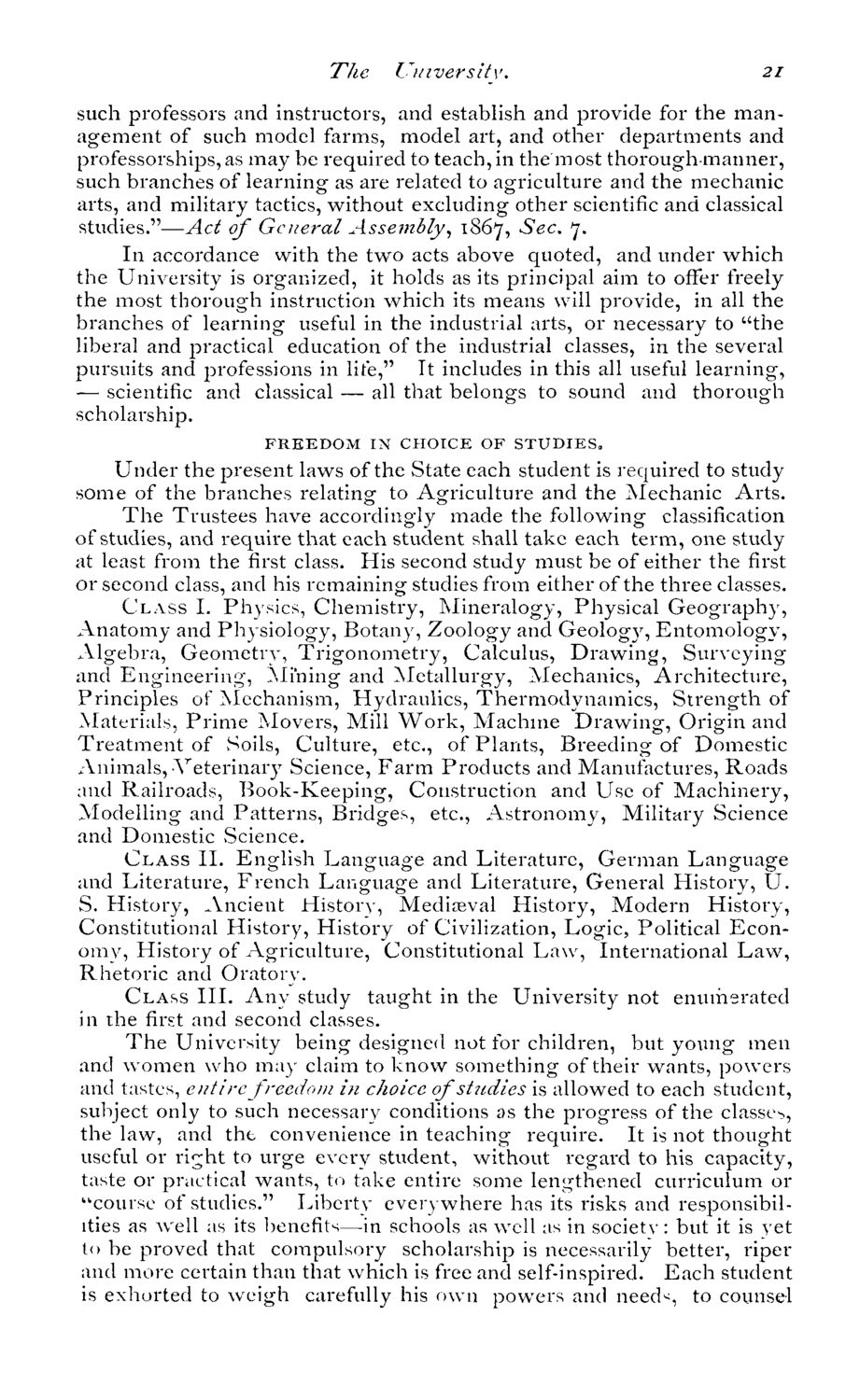| |
| |
Caption: Course Catalog - 1874-1875
This is a reduced-resolution page image for fast online browsing.

EXTRACTED TEXT FROM PAGE:
The University. 21 such professors and instructors, and establish and provide for the management of such model farms, model art, and other departments and professorships, as may be required to teach, in the most thorough-manner, such branches of learning- as are related to agriculture and the mechanic arts, and military tactics, without excluding other scientific and classical studies."—Act of General Assembly, 1867, Sec. 7. In accordance with the two acts above quoted, and under which the University is organized, it holds as its principal aim to offer freely the most thorough instruction which its means will provide, in all the branches of learning useful in the industrial arts, or necessary to "the liberal and practical education of the industrial classes, in the several pursuits and professions in life," It includes in this all useful learning, — scientific and classical — all that belongs to sound and thorough scholarship. FREEDOM IN CHOICE OF STUDIES. Under the present laws of the State each student is required to study some of the branches relating to Agriculture and the Mechanic Arts. The Trustees have accordingly made the following classification of studies, and require that each student shall take each term, one study at least from the first class. His second study must be of either the first or second class, and his remaining studies from either of the three classes. CLASS I. Physics, Chemistry, Mineralogy, Physical Geography, Anatomy and Physiology, Botany, Zoology and Geology, Entomology, Algebra, Geometry, Trigonometry, Calculus, Drawing, Surveying and Engineering, Mining and Metallurgy, Mechanics, Architecture, Principles of Mechanism, Hydraulics, Thermodynamics, Strength of Materials, Prime Movers, Mill Work, Machine Drawing, Origin and Treatment of Soils, Culture, etc., of Plants, Breeding of Domestic Animals,-Veterinary Science, Farm Products and Manufactures, Roads and Railroads, Book-Keeping, Construction and Use of Machinery, Modelling and Patterns, Bridges, etc., Astronomy, Military Science and Domestic .Science. CLASS I I . English Language and Literature, German Language and Literature, French Language and Literature, General History, U . S. History, Ancient History, Mediaeval History, Modern History, Constitutional History, History of Civilization, Logic, Political Economy, History of Agriculture, Constitutional Law, International Law, Rhetoric and Oratory. CLASS I I I . Any study taught in the University not enumerated in the first and second classes. The University being designed not for children, but yovnig men and women who may claim to know something of their wants, powers and tastes, entire freedom in choice of studies is allowed to each student, subject only to such necessary conditions as the progress of the classes, the law, and tht convenience in teaching require. It is not thought useful or right to urge every student, without regard to his capacity, taste or practical wants, to take entire some lengthened curriculum or "course of studies." Liberty everywhere has its risks and responsibilities as well as its benefits—in schools as well as in society: but it is yet to be proved that compulsory scholarship is necessarily better, riper and more certain than that which is free and self-inspired. Each student is exhorted to weigh carefully his own powers and need*, to counsel
| |